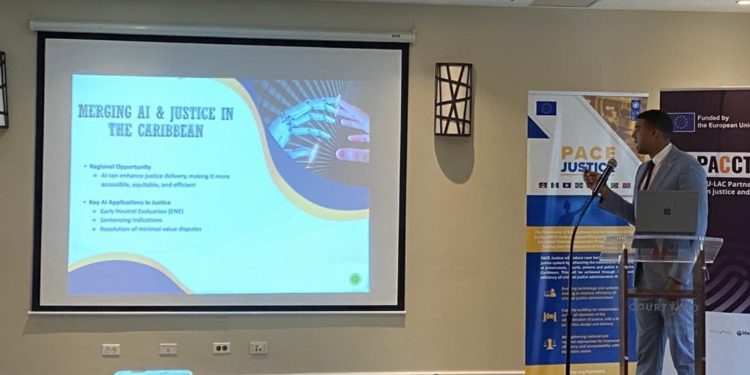AI-Driven Justice Innovations in Saint Kitts and Nevis Presented at UNDP-EU Workshop
Saint Kitts and Nevis is pioneering a digital transformation in its justice system, leveraging artificial intelligence (AI) to address long-standing challenges such as court backlogs and limited public access to legal information. This forward-looking approach, spearheaded by Attorney General Garth Wilkin, positions the twin-island nation as a regional leader in digital justice reform, showcasing the potential of AI to revolutionize how justice is delivered in the Caribbean. Wilkin’s presentation at a recent UN-backed workshop highlighted the country’s commitment to innovation, emphasizing the practical application of AI to create a more efficient and equitable legal system.
Central to this digital transformation is VoiceIt, the Caribbean’s first government-deployed AI legal assistant. This locally developed platform, trained on the laws of Saint Kitts and Nevis, provides free and accessible legal guidance to the public through familiar channels like WhatsApp and web chat. Its rapid adoption, with over 2,000 public interactions in just three months, demonstrates the public’s eagerness for readily available legal information. This innovative tool embodies the core principle of using technology to bridge the gap between the justice system and the citizens it serves.
Beyond VoiceIt, Saint Kitts and Nevis is embracing a comprehensive digital transformation strategy. This includes a partnership with the Caribbean Agency for Justice Solutions (CAJS) aimed at modernizing records management, automating legal document generation, and strengthening institutional capacity. These interconnected initiatives demonstrate a holistic approach to reform, recognizing that technology’s impact is maximized when integrated across the entire justice ecosystem. This strategy aims not just to digitize existing processes, but to redesign them for greater efficiency and effectiveness.
Attorney General Wilkin emphasized the importance of responsible AI implementation. He highlighted the need for strong governance frameworks and ethical safeguards, drawing on internationally recognized standards like the International Framework for Court Excellence (IFCE). This focus on responsible deployment assures that AI remains a tool to support human judgment, not replace it, preserving the integrity of the legal process while benefiting from technological advancements. This careful approach addresses concerns about the potential biases and limitations of AI, ensuring that its application aligns with fundamental legal principles.
The success of Saint Kitts and Nevis’ digital justice initiative underscores the potential for regional collaboration. Wilkin called for deeper cooperation among CARICOM member states and regional judicial bodies to share best practices, develop ethical standards, and harmonize data systems. Such collaboration can amplify the benefits of AI, creating a network of digitally advanced justice systems across the Caribbean. This regional approach fosters a more cohesive and efficient legal landscape, promoting best practices and addressing common challenges collectively.
The experience of Saint Kitts and Nevis provides a compelling case study for other nations considering digital justice reforms. It demonstrates that AI, when implemented strategically and responsibly, can significantly improve access to justice, streamline legal processes, and empower citizens with legal knowledge. This proactive approach to leveraging technology not only modernizes the justice system but also strengthens the rule of law, contributing to a more just and equitable society. The focus on accessibility, efficiency, and ethical considerations ensures that the digital transformation benefits all stakeholders, fostering trust and confidence in the legal system.
Share this content:












Post Comment